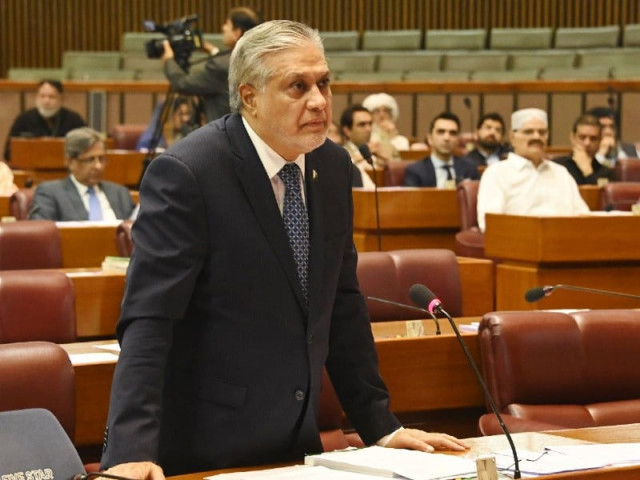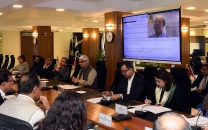Dar blames ‘shift’ in Pakistan’s Afghan policy after US exodus for surge in terror attacks
PML-N Senator blasts policy of engaging with Afghan Taliban following their takeover of Kabul

Amid an uptick in terror activities in recent months, Pakistan Muslim League-Nawaz (PML-N) Senator and former finance minister Ishaq Dar on Monday blasted the policy of engaging with the Afghan Taliban following their takeover of Kabul in August 2021.
Addressing the Senate, Dar, without explicitly naming any entity or individual, accused those responsible for the policy shift of releasing "hardened criminals," presumably referring to the Tehreek-e-Taliban Pakistan (TTP) in a bid for peace.
Dar's comments are widely interpreted as directed at the Pakistan Tehreek-e-Insaf (PTI) government, led by former prime minister Imran Khan. He criticised the apparent foreign policy shift, asserting it was executed without consultation with allies and at the behest of a few individuals.
He questioned the necessity of certain individuals travelling to Afghanistan for a "photo session," alluding to former DG-ISI General (Retd) Faiz Hameed's visit to Kabul, where he was quoted as saying that "everything will be ok" after the Taliban took control.
Dar contended that this policy shift, seemingly extending support to the Afghan Taliban, has led to an unprecedented surge in terrorist attacks within Pakistan.
His remarks come in the wake of Pakistan's chief diplomat for Afghanistan, Asif Durrani, alleging that the outlawed Tehreek-e-Taliban Pakistan (TTP) is under the control of the Afghan Taliban, causing strain in bilateral relations between the two neighbouring countries.
On Sunday the diplomat said that they "cannot fathom the fact that the TTP people, who are living in Afghanistan, are under their (Afghan Taliban) control. They are allowed to cross the Pakistan border and conduct sabotage activities, massacre and then go back.
کس نے کہا تھا کہ آپ طالبان سے بات کریں؟ سینٹ میں اسحاق ڈار بھڑک اٹھے#Expressnews #Pakistan #News #Senate #IshaqDar pic.twitter.com/I2ATwrF9S1
— Express News (@ExpressNewsPK) November 13, 2023
“This is something that is discomforting for us", Pakistan special representative for Afghanistan Asif Durrani said in an interview.
Pakistani officials have often privately spoken about the Afghan Taliban-TTP nexus, but this is the first time a senior official has publicly talked about it.
Meanwhile, speaking on the floor of the upper house, Caretaker Interior Minister Sarfraz Bugti conveyed a belief in the shared Islamic brotherhood between Pakistan and Afghanistan. Delving into historical context since Pakistan's inception in 1947, Bugti highlighted initial opposition from Afghanistan regarding Pakistan's creation.
Touching on the issue of violence and blasts within the country, Bugti suggested that both nations had been involved in a proxy war.
He expressed concerns about Afghan businesses operating in urban areas without paying taxes and emphasised the caretaker government's commitment to establishing a state with equal rights for all.
Providing statistics on repatriation, Bugti said that approximately 300,000 people had returned, with only 8,000 sent back by Pakistan, and the rest returning voluntarily.
Read More: PM calls out Afghan Taliban on terror spike
Pakistan Tehreek-e-Insaf’s Senator Humayun Mohmand addressed concerns about the repatriation of Afghan refugees, emphasising the need for a distinction between legal and illegal immigrants.
Mohmand questioned the reasons behind categorising certain individuals as illegal immigrants and criticised the alleged release of terrorists.
He pointed out that the most peaceful period in the last two decades was during the PTI rule. Mohmand accused certain individuals of engaging in what he termed as "dirty politics" while avoiding accountability for their own policies over the past several decades.
Read More: Pakistan shifts stance on Afghan Taliban
Renowned Pakistani journalist and Senator Irfan Siddiqui also raised concerns over the sudden repatriation of three generations of Afghan refugees, stating that they were initially welcomed with open arms but are now being forcibly sent back.
Siddiqui emphasised the need for a fair and just process, suggesting the establishment of a tribunal to oversee the repatriation process.



















COMMENTS
Comments are moderated and generally will be posted if they are on-topic and not abusive.
For more information, please see our Comments FAQ